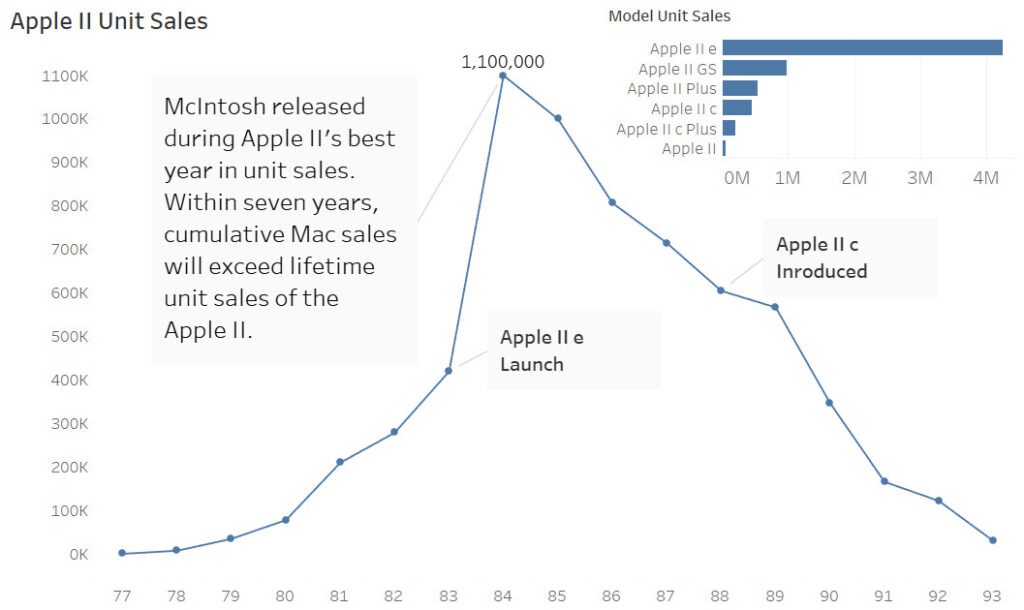Many business readers who are fans of Apple will probably state that Walter Isaacson’s book on Steve Jobs is the best starting point for learning about the business he co-founded with Steve Wozniak. Thanks to my guest and his unique insights on this episode, I now believe that Return to the Little Kingdom by Michael Moritz is the go-to book for learning both the backstory and the early days of this unicorn.
Episode Highlights
- Why read Return to the Little Kingdom, and how does it compare to the Isaacson book?
- The relationship between Steve Jobs and the author
- David Kopec’s first impressions of the book
- The geek and the visionary
- Laborious market research vs. intuition
- The bicycle of the mind
- The vital role of Mike Markkulla (and later Mike Scott)
- Apple’s timeline through 1984
- The three businesses preceding the manufacture of the Apple I
- John Draper and the infamous blue box story
- The critical role of Regis McKenna

The Cast of Characters
Below is my short list of the most memorable names in this book:
- Steve Wozniak – the tech geek who loved games and gadgets with no head for money or business – wanted a guaranteed check.
- Steve Jobs – considered a flake by many who walked barefoot and followed a unique diet. While his people skills were questioned, his flare for tech-savvy aesthetics was second to none.
- Bill Fernandez was the first employee at Apple, and he introduced Wozniak to Jobs.
- Mike Markkula was the first ‘real’ CEO of Apple and the first financial backer of Wozniak and Jobs.
- Mike Scott was the first CEO Markkula hired to turn chaos into order as the company started scaling fast. His hard-nosed style led to his departure a few years later.
- Gary Martin – not a significant key person at Apple, but he was their first accountant.
- John Draper probably deserves his own book, but he was the weird phone guy who spent time in prison. John is the central figure behind the infamous Blue Box story in the book.
Meaningful and Memorable Lines
A description of Jobs while attending Reed college:
Jobs’s critics will say he can be willful, obdurate, irascible, temperamental, and stubborn—but show me someone who has achieved anything meaningful who, from time to time, doesn’t display these characteristics, who is not a perfectionist.
On Jobs meeting Woz for the first time:
When the computer was almost complete, Fernandez invited his friend Steven Jobs to drop by the garage, take a look at the computer, and meet its designer. Jobs was, in his own way, impressed by the machine and by Wozniak: “He was the first person I met who knew more electronics than I did.”
Regarding money and quality:
“Steve was always very, very tight with money. He always wanted to get the best value for the least amount of money. Steve always wanted to make things of high quality and have high-quality equipment. He always wanted to do it right.”
According to Regis McKenna:
First, he was an incredibly smart young man. Second, I didn’t understand a fiftieth of what he was talking about.”
The Apple II coming to life:
In January 1978 Penthouse magazine, in a review of personal computers, noted, “The Apple II is, in many people’s opinion, the Cadillac of home computers.”
On the way Jobs measured recruits:
Jobs distrusted résumés and preferred to rely on his instincts.
From the transition of a business to a company:
“The character has changed because the company has grown. There is more overhead, policies have been created, administrators have been hired, and there are rigidities. There is less whimsy. Now things happen pretty much as expected. It’s more like an organized company.”
On culture:
“If you have a strong culture you don’t have to supervise people so closely and you don’t have to have so many rules, regulations, and procedures because everybody thinks the same way and they all react to situations in the same way. It helps you delegate more effectively. For example, you can put a bunch of marines on the beach under fire and they’ll actually run up the beach. Companies that don’t have strong cultures cannot do anything quickly.”
Culture and results:
Jobs certainly found the theory of a corporate culture alluring but he was more taken by actions that offered immediate, tangible results. He certainly wanted to make Apple a pleasant place to work.
Intuition vs. data:
Jobs had little interest in laborious research. There was nothing he believed in more deeply than his own intuition and his sense and touch for where the technology and markets would meet.
More on intuition:
Jobs developed what amounted to a religious faith in the strength of his instincts: “You make a lot of decisions based on the fragrance or the odor of where you think things are going.” He was unwilling to let product planning become burdened with analysis, focus groups, decision trees, the shifts of the bell curve, or any of the painful drudgery he associated with large companies.
On the drive of Steve Jobs:
Inside the company he gained a reputation for possessing a flair for getting things done, for having a gentle touch for the “soft side” of production. “He has,” said Bill Atkinson, “a drive for excellence, simplicity, and beauty.” And Tom Whitney observed, “One of Jobs’s attributes is an infinite patience to make something better. It’s never good enough for him. He always wants more features with less cost. He always wants to leapfrog the next natural step. A lot of the success of Apple is due to his damned stubbornness but it’s also very difficult to work around because he always wants everything.”
On the inability to replicate the success of the Apple II:
“They blew the Apple III and they knew it when they announced it.
On the PC pulling market share from Apple:
In 1979 Apple and Commodore owned 80 percent of the Japanese market; by 1980 this had slumped to 40 percent and the November 1981 issue of the Japan Economic Journal reported: “The three leading American personal computer makers—Apple Computer, Commodore International and Tandy—have witnessed their combined market share in Japan plunge from 80-90 percent in 1979 to less than 20 percent at present.”

Who Is David Kopec?
I love Business Books & Co. David is one of the co-creators of this show, and I consider him the anchor of each episode. When I asked David if we could do a behind-the-scenes show about his podcast, he said, “Sure, but can we do a show on one of my favorite books?” And that’s how this episode originated.
You can find the Business Books and Co. episode catalog on their website. David also hosts Kopec on Software with his wife. He’s the author of several books, including Classic Computer Science Problems in Python.
Don’t forget to check out our show on David’s podcast.
Title Photo Credit: by Mathieu Thouvenin – originally posted to Flickr

Leave a Reply